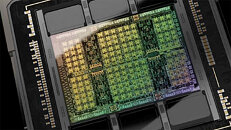- Joined
- Aug 19, 2017
- Messages
- 2,651 (0.99/day)
NVIDIA is anticipating supply issues for its upcoming Blackwell GPUs, which are expected to significantly improve artificial intelligence compute performance. "We expect our next-generation products to be supply constrained as demand far exceeds supply," said Colette Kress, NVIDIA's chief financial officer, during a recent earnings call. This prediction of scarcity comes just days after an analyst noted much shorter lead times for NVIDIA's current flagship Hopper-based H100 GPUs tailored to AI and high-performance computing. The eagerly anticipated Blackwell architecture and B100 GPUs built on it promise major leaps in capability—likely spurring NVIDIA's existing customers to place pre-orders already. With skyrocketing demand in the red-hot AI compute market, NVIDIA appears poised to capitalize on the insatiable appetite for ever-greater processing power.
However, the scarcity of NVIDIA's products may present an excellent opportunity for significant rivals like AMD and Intel. If both companies can offer a product that could beat NVIDIA's current H100 and provide a suitable software stack, customers would be willing to jump to their offerings and not wait many months for the anticipated high lead times. Intel is preparing the next-generation Gaudi 3 and working on the Falcon Shores accelerator for AI and HPC. AMD is shipping its Instinct MI300 accelerator, a highly competitive product, while already working on the MI400 generation. It remains to be seen if AI companies will begin the adoption of non-NVIDIA hardware or if they will remain a loyal customer and agree to the higher lead times of the new Blackwell generation. However, capacity constrain should only be a problem at launch, where the availability should improve from quarter to quarter. As TSMC improves CoWoS packaging capacity and 3 nm production, NVIDIA's allocation of the 3 nm wafers will likely improve over time as the company moves its priority from H100 to B100.

View at TechPowerUp Main Site | Source
However, the scarcity of NVIDIA's products may present an excellent opportunity for significant rivals like AMD and Intel. If both companies can offer a product that could beat NVIDIA's current H100 and provide a suitable software stack, customers would be willing to jump to their offerings and not wait many months for the anticipated high lead times. Intel is preparing the next-generation Gaudi 3 and working on the Falcon Shores accelerator for AI and HPC. AMD is shipping its Instinct MI300 accelerator, a highly competitive product, while already working on the MI400 generation. It remains to be seen if AI companies will begin the adoption of non-NVIDIA hardware or if they will remain a loyal customer and agree to the higher lead times of the new Blackwell generation. However, capacity constrain should only be a problem at launch, where the availability should improve from quarter to quarter. As TSMC improves CoWoS packaging capacity and 3 nm production, NVIDIA's allocation of the 3 nm wafers will likely improve over time as the company moves its priority from H100 to B100.

View at TechPowerUp Main Site | Source






